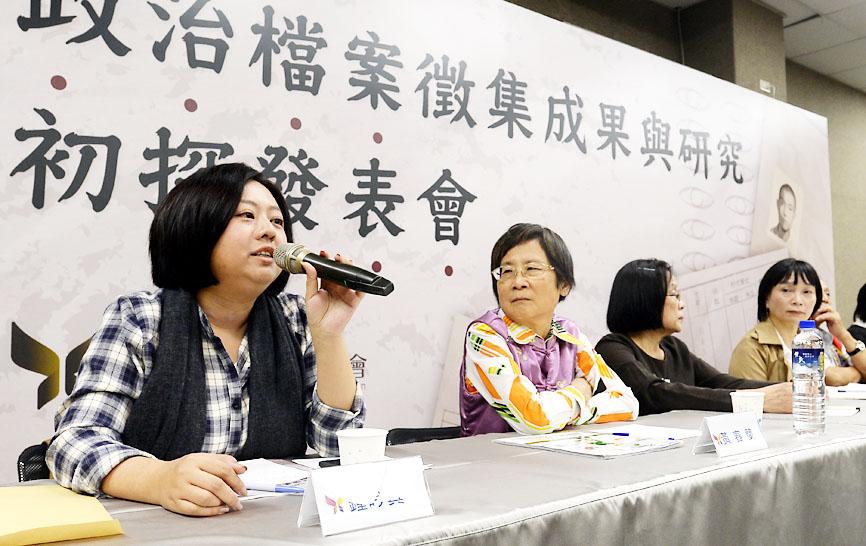The Transitional Justice Commission yesterday presented a sixth batch of declassified Chinese Nationalist Party (KMT) records at a forum in Taipei, with the contents showing abuse of power and violations of human rights extending up until the year 2000.
The batch contained 77,000 files, mainly records of citizens targeted by the KMT, Commission Chairwoman Yang Tsui (楊翠) said, adding that most of them came from the archives of the Taiwan Provincial Police Division, the forerunner of the National Police Agency.
“This forum focusing on the secret surveillance of family members of suspected political dissidents and communist sympathizers during the White Terror era shows that they monitored the entire family, even after the victim was executed or imprisoned,” Yang said.

Photo: Lin Cheng-kung, Taipei Times
Commission researcher Chen Yu-chi (陳昱齊) said that the records indicated that the KMT government had at most in one year placed 15,000 citizens under constant surveillance, and that figure later decreased to about 8,000 to 7,000 in a year.
Besides the Taiwan Provincial Police Division, the other agencies in KMT’s surveillance network included the Taiwan Garrison Command, the Ministry of Justice’s Investigation Bureau, the Political Warfare Bureau and the KMT Central Committee’s mainland China affairs department, Chen said.
The KMT’s surveillance network constantly monitored people suspected of being political dissidents or communist sympathizers up until Chen Shui-bian (陳水扁) of the Democratic Progressive Party was elected president in 2000.
The family of Chung Hao-tung (鍾浩東) attended the forum. Chung was a high-school principal who was arrested and tortured in 1949 on suspicion of being a communist, and later sentenced to death and executed in October 1950.
Chung’s granddaughter, Chung Yin-chen (鍾吟真), said that almost all of her family and their friends were monitored by the KMT, as the list of names took up three pages in the records and even included a friend who only visited her father a few times.
“My father’s elder brother began farming in a remote mountain village, and they put him under surveillance. The KMT’s state apparatus clearly used huge resources ... to monitor suspected political dissidents,” she said. “Their methodology was to show no mercy, to kill 100 innocent people in order not to miss one real guilty person.”
Huang Wen-gong (黃溫恭), a dentist in Kaohsiung’s Lujhu District (路竹), was executed by firing squad in May 1953 under direct orders from then-president Chiang Kai-shek (蔣介石) because he was suspected of being a communist.
His oldest daughter, Huang Ling-lan (黃鈴蘭), said: “I recently saw the declassified file on my father and my family. It was quite a shock to find that they had placed me under constant surveillance after had I reached the age of 18, and it had very detailed records on me.”
Huang Wen-gong’s second daughter, Huang Chun-lan (黃春蘭), said: “I came to attend this forum, and took the Taipei subway system which passed by the Chiang Kai-shek Memorial Hall Station, a monument dedicated to an evil dictator. When will justice prevail? When will the government make changes to this memorial?”

Intelligence agents have recorded 510,000 instances of “controversial information” being spread online by the Chinese Communist Party (CCP) so far this year, the National Security Bureau (NSB) said in a report yesterday, as it warned of artificial intelligence (AI) being employed to generate destabilizing misinformation. The bureau submitted a written report to the Legislative Yuan in preparation for National Security Bureau Director-General Tsai Ming-yen’s (蔡明彥) appearance before the Foreign Affairs and National Defense Committee today. The CCP has been using cognitive warfare to divide Taiwanese society by commenting on controversial issues such as Taiwan Semiconductor Manufacturing Co’s (TSMC, 台積電) investments in the

INVESTIGATION: The case is the latest instance of a DPP figure being implicated in an espionage network accused of allegedly leaking information to Chinese intelligence Democratic Progressive Party (DPP) member Ho Jen-chieh (何仁傑) was detained and held incommunicado yesterday on suspicion of spying for China during his tenure as assistant to then-minister of foreign affairs Joseph Wu (吳釗燮). The Taipei District Prosecutors’ Office said Ho was implicated during its investigation into alleged spying activities by former Presidential Office consultant Wu Shang-yu (吳尚雨). Prosecutors said there is reason to believe Ho breached the National Security Act (國家安全法) by leaking classified Ministry of Foreign Affairs information to Chinese intelligence. Following interrogation, prosecutors petitioned the Taipei District Court to detain Ho, citing concerns over potential collusion or tampering of evidence. The

‘COMPREHENSIVE PLAN’: Lin Chia-lung said that the government was ready to talk about a variety of issues, including investment in and purchases from the US The National Stabilization Fund (NSF) yesterday announced that it would step in to staunch stock market losses for the ninth time in the nation’s history. An NSF board meeting, originally scheduled for Monday next week, was moved to yesterday after stocks plummeted in the wake of US President Donald Trump’s announcement of 32 percent tariffs on Taiwan on Wednesday last week. Board members voted to support the stock market with the NT$500 billion (US$15.15 billion) fund, with injections of funds to begin as soon as today. The NSF in 2000 injected NT$120 billion to stabilize stocks, the most ever. The lowest amount it

NEGOTIATIONS: Taiwan has good relations with Washington and the outlook for the negotiations looks promising, Minister of Economic Affairs J.W. Kuo said Taiwan’s GDP growth this year is expected to decrease by 0.43 to 1.61 percentage points due to the effects of US tariffs, National Development Council (NDC) Minister Paul Liu (劉鏡清) said at a meeting of the legislature’s Economics Committee in Taipei yesterday, citing a preliminary estimate by a private research institution. Taiwan’s economy would be significantly affected by the 32 percent “reciprocal” tariffs slapped by the US, which took effect yesterday, Liu said, adding that GDP growth could fall below 3 percent and potentially even dip below 2 percent to 1.53 percent this year. The council has commissioned another institution